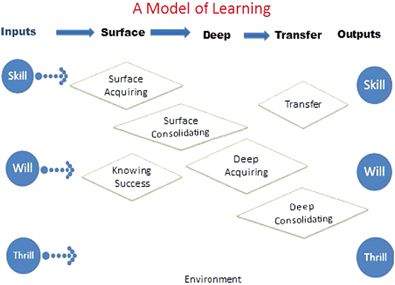npj Science of Learning ( IF 3.6 ) Pub Date : 2016-08-10 , DOI: 10.1038/npjscilearn.2016.13 John A C Hattie 1 , Gregory M Donoghue 1

|
The purpose of this article is to explore a model of learning that proposes that various learning strategies are powerful at certain stages in the learning cycle. The model describes three inputs and outcomes (skill, will and thrill), success criteria, three phases of learning (surface, deep and transfer) and an acquiring and consolidation phase within each of the surface and deep phases. A synthesis of 228 meta-analyses led to the identification of the most effective strategies. The results indicate that there is a subset of strategies that are effective, but this effectiveness depends on the phase of the model in which they are implemented. Further, it is best not to run separate sessions on learning strategies but to embed the various strategies within the content of the subject, to be clearer about developing both surface and deep learning, and promoting their associated optimal strategies and to teach the skills of transfer of learning. The article concludes with a discussion of questions raised by the model that need further research.
中文翻译:

学习策略:综合和概念模型
本文的目的是探索一种学习模型,该模型提出各种学习策略在学习周期的某些阶段是有效的。该模型描述了三种输入和结果(技能、意志和兴奋)、成功标准、学习的三个阶段(表面、深层和迁移)以及每个表面和深层阶段内的获取和巩固阶段。综合 228 项荟萃分析,确定了最有效的策略。结果表明,有一部分策略是有效的,但这种有效性取决于它们实施的模型阶段。此外,最好不要单独举办关于学习策略的课程,而是将各种策略嵌入到主题内容中,以便更清楚地发展表面学习和深度学习,并促进其相关的最佳策略并教授迁移技能的学习。本文最后讨论了该模型提出的需要进一步研究的问题。











































 京公网安备 11010802027423号
京公网安备 11010802027423号